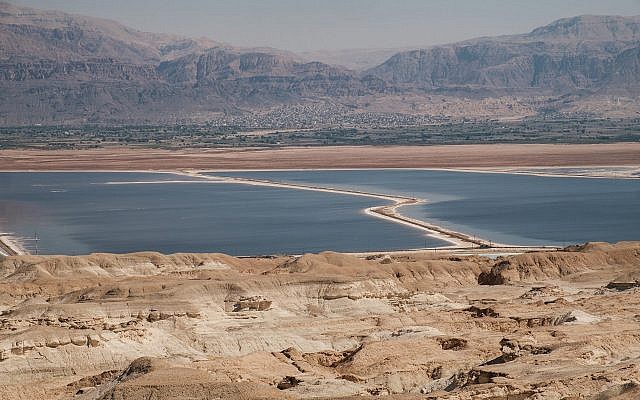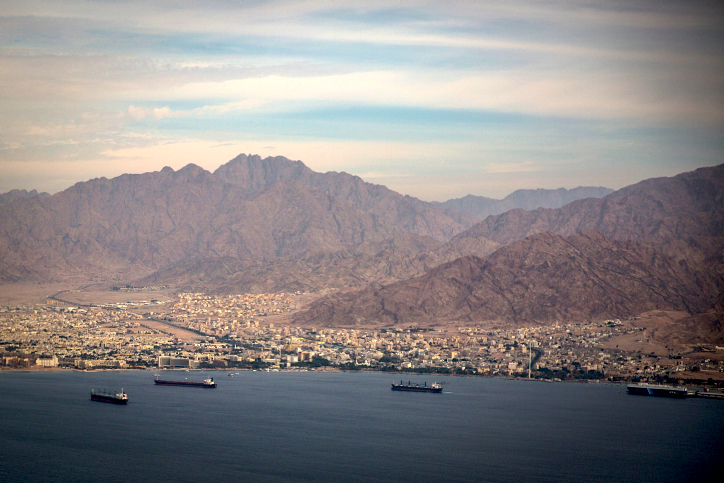Amman has been frustrated by long-stalled plans to jointly pump water from Red Sea to shrinking salt-water lake

Israel is seeking to advance work on the long-stalled Red Sea-Dead Sea project as a means of improving its relations with Jordan, Haaretz reported Friday.
The report said Israeli officials believe the repeated delays in implementing the project are a central factor in ongoing tensions between Jerusalem and its neighbor, which suffers from severe water shortages that could be alleviated by the canal.
According to the plan, a desalination plant in Jordan will provide much-needed drinking water to the region while its brine (very salty water left over from the desalination process) will be pumped north to the Dead Sea to replenish the fast-shrinking lake, while also producing green energy through use of water turbines.
The project has long been delayed by bureaucratic hurdles, financing difficulties and environmentalist objections, as well as diplomatic tensions between the countries. The delays have elicited anger from Amman, which has reportedly demanded answers on whether Israel is still committed to its implementation.
Officials are now looking at the possibility of redefining the project as one with security implications, in order to help bypass red tape, open up new funding possibilities and make it easier to win against expected environmentalist petitions.

Jordan announced earlier this month that it will not renew an agreement to lease two parcels of land on the border to Israel for agriculture use, which it has done for the past 24 years as part of an annex of the historic peace treaty between the nations signed in 1994.
Jordan has said the decision will not affect the decades-old peace agreement, seeking to assuage fears in Jerusalem that ties could be downgraded.
Officials in Israel have expressed fears that the move signaled Jordan’s desire to effectively reduce diplomatic ties, and many saw it as a reflection of intense domestic pressure from a public that still largely views Israel as an enemy.
With the announcement, the sides now have a year to negotiate the end of the lease. While Prime Minister Benjamin Netanyahu had indicated he would lobby for Amman to reverse the decision, Jordan’s Foreign Minister Ayman Safadi said that the only item on the table was the mechanism for canceling the agreement.
Tensions between Israel and Jordan have mounted in recent months over such issues as the contested status of Jerusalem and its holy sites, stalled peace talks with the Palestinians, and last year’s shooting of two Jordanian citizens by an Israeli embassy guard in Amman, which ignited a diplomatic crisis.



Israel desperately needs two desalinization plants in the north to save the Kineret (Sea of Galilee) and the main aquifer. Any excess could be released into the Jordan River and then feed the Dead Sea.
@ Uzitiger:
I believe you are right. There have been a variety of studies which said that Med water (which is where water for the Jordan, desalinated or not would have to come and it’s right next door almost) was not the right kind of water But there were also studies which said the same about Red Sea water, as well as insisting that the coral would be ruined also. Perhaps the Red Sea project is being pushed because it’s a kind of peace manoeuvre to satisfy Jordan…. Well….I wouldn’t do it….it’ll cost billions.
Of course there will be power and desalinated water benefits….according to the plans. But I think they could get the same from a Med project…not the same amount of power maybe, but as much water as they wanted and not nearly as salty to begin with.
Am I wrong in saying that China got the labour contract or was that for the/q railway to Eilat. ??
Using Red Sea water to fill the Dead Sea is a bad idea. It would be better to allow water from the Jordan to reach the Dead Sea. With desalination, more Jordan River water can be sent downstream which is less costly and can be implemented right now.